Being a conservative in the arts has also been great for me because those in the arts give me a full environment to hear other perspectives. Being close to those with different viewpoints has opened my mind and sometimes changed it (and sometimes reinforced it), but either way it’s been an expanding experience. I sometimes wonder if my liberal artistic friends get this same exposure from the other side. I worry that some get trapped in echo-chambers and don’t get to really listen to those with the different viewpoint, simply because they lack that exposure to a deeper conservative base. – Carleton Bluford, playwright, Dinner, (in)divisible.
In 2012, Charles Murray’s book Coming Apart: The State of White America 1960–2010 evoked and provoked equal doses of praise and criticism. In plainest terms, Murray’s thesis outlined a nation divided into two classes marked by cultural and epistemological differences as much as they were by economic status. He offered a quiz of 25 questions, titled How Thick Is Your Bubble? Depending upon how an individual scored, Murray intended the quiz to demonstrate how many Americans – especially those living in more affluent areas and with higher levels of education – often look at their ‘ordinary’ counterparts with contempt and ridicule.
In 2016, Murray’s book took on acute relevance. In an April 2017 interview shared on the podcast Waking Up With Sam Harris, he talked briefly about why Hillary Clinton’s characterization of Trump supporters as ‘deplorables’ may have changed world history. Murray said:
That one comment by itself may have swung enough votes, it certainly was emblematic of the disdain with which the New Upper Class looks at mainstream Americans.
And mainstream America notices this… People will say: ‘You don’t understand. We don’t particularly like Donald Trump, we won’t defend his character. He is our murder weapon.’
I think that is a pretty short, accurate way of showing what function Trump served…
On Nov. 9, the day after the 2016 presidential election, like many disappointed voters, Jerry Rapier and Cheryl Ann Cluff, the leaders of Plan-B Theatre, talked about their concerns: “What should we do as a theater company was our discussion,” as Rapier recalls, “and it didn’t take long for us to figure out what we should do.”
This month, Plan-B Theatre will present (in)divisible, a two-act production run (June 8-18) of short plays by 12 Utah playwrights that presents stories which are equal in terms of conservative and liberal perspectives. It is an ambitious nonpartisan project for a company known for work which emphasizes enlightened social conscience that resonates among mostly liberal and progressive audiences. However, (in)divisible also represents Plan-B’s sensitive, mature approach to be provocative without resorting to polemics, grandstanding, or shock theatrics.
Each of the 24 miniature plays runs between three to five minutes. The production is part of the company’s Script-in-Hand Series.
“We definitely wanted to be less about the election and more about understanding how we have moved so far apart as we have settled into these vast echo chambers,” Rapier explains. “The purpose of the play is to really make us listen to each other more carefully.”
Rapier and Cluff challenged the playwrights to present two perspectives and to be just as attentive to opposing views as they were to ideals and themes more familiar to their sociopolitical character. Playwrights also were asked not to mention any political figures by name.
The plays were workshopped through Plan-B’s The Lab, the creative incubator for playwrights. While Rapier says some playwrights initially struggled with writing work that differed from their own political affiliations or thinking, the process generated intellectually stimulating content that should also challenge audience members to listen carefully to the ideas and opinions of others who have different points of view.
The plays reference many issues, including immigration, crime, women’s rights, environment, discrimination, economics and education. In Dream No Dream, Julie Jensen gives the opening lines to Jayne, who says, “I don’t want a damn thing from the government, except good schools, clean air, safe water, and help for those who need it.” Later, she mentions her brother: “Now he’s getting even with me. Why? Because he can. Although even he knows we’re in trouble, a big toilet of trouble. Because his wife can’t get Medicaid for her mother.”
In her second play, American Man from Iran, Jensen casts dialogue between a teacher who came from Iran and an American-born college student who is hoping to get a grade change for a class. The teacher scolds the student, whose father is holding down two jobs so his son can attend college, for his laziness and his indifference to the opportunity he has been given. The immigrant teacher says, “This country has got to get fixed. Or else boys like you. You will ruin it.”
There are no ridiculous or absurd comments in any of the plays. In Morag Shepherd’s The March, the actor says, “I’m sick of being told what I can and can’t eat … It’s like my stepmother has come out and is still controlling me through everyone’s sanctimonious ass fuck opinions that march over everything.”
In her counterpart piece, Mother Earth, she writes, “She said it was bound to happen—I just turned 4.543 billion years old … and in the last little while, I’ve been plundered and pillaged excessively – not that that’s any of her business, or mine … I’m just here, and people do what they want with me. She told me, “The best thing to do is to build a wall around it—and not let anyone in.”
The painful realization of condescending assumptions and stereotyping is prominent in Spam by Jenifer Nii. “I’m first generation Japanese American, and I still make judgmental assumptions about Koreans and the Chinese. White people do all kinda look alike to me and sometimes I don’t bother to remember their names. I carry my keys in my fist, keys between my fingers like Wolverine, more often when I’m in West Valley City than I do in Sugarhouse. I am a racist, and I have been, this whole time.”
In Damned If You Do, Nii casts a young, white, middle-class man who is aware of his privilege but struggles to be sincere in learning to be as respectful and inclusive as possible: “Tell me how to get in, without hurting you or making you roll your eyes because for most people that’s enough to stop any kind of getting-to-know.”
The perspectives ring reasonably, regardless of the origins from either side of the ideological aisle. In Rachel Bublitz’s Blue, the appearance of swastikas and the casual labeling of individuals as Nazis are taken up appropriately for their confusing impact: “But guess what? It’s impossible to tell which it’s supposed to be.”
In Bublitz’s companion piece, Red, a teacher laments the failure to help children who came with their families from other countries. The question is harsh but valid, even as insensitive as it might sound to some: “And so, if we’re not able to help the people that are here now, if we’re not making their lives better, why should we let more of them in the country? We don’t have the resources. I’ve seen it, I’ve been there, and I can tell you, we are failing the kids that are here already.”
Get Over It by Elaine Jarvik signals the conservative pride in putting God before government. Dismissive of socialism as allocating misery to everyone, the actor proclaims her belief as “similar to the Founding Fathers’: it’s all about the individual, not the collective.” Jarvik plumbs the rationale for being defined either as liberal or progressive. In Safety (Pins And Otherwise), a liberal explains her belief in the impact of governmental regulation: “I like the idea of a federal government that can protect me from danger and greed and stupidity—from coal companies and exploding airbags and crazy people with guns. I want the federal government to regulate the heck out of everything.”
Carleton Bluford’s pair of plays explores reactions and emotions that have sharpened significantly in the aftermath of last November’s elections. In Passenger, there is an exchange between a driver and his passenger who is leaving the airport. The driver opens the discussion, “I think we’ve forgotten how to listen in this country and that’s a shame … look, I know the rules when just meeting new people is that you don’t ask how much they make and you don’t talk about politics, but I wouldn’t mind hearing your perspective if you’re willing to tell it.” In a few minutes, Bluford casts a dialogue that captures political tensions in a constructive frame which does not shortchange the political frustrations with which many can identify.
Dinner, Bluford’s other play, captures the problems of the echo chamber rhetoric, especially when a person’s political views differ dramatically from others in a close environment. As the actor explains, “That’s why in the theater, I never bring up that I’m a conservative, I can’t. I’m afraid that people will put me in a box, they’ll feel less about me rather than just knowing that I have a different opinion and that that’s ok.”
Melissa Leilani Larson takes on the benefits and risks of cultural assimilation for immigrants in the metaphor-rich Erasers, while in the equally metaphorical Gluten, she presents a critic of those who cross borders “without asking” and who don’t care to assimilate. The actor explains, “They hope no one will notice, but they don’t even try to speak the language that I learned because I had to. Well, I notice, and I don’t like it. People want to make citizenship easy. But it’s not easy. When it’s easy, it’s not worth it. People don’t value it. They trample on it like it’s nothing. Trash or worse.”
Eric Samuelsen’s Democracy points to the shortcomings of the great American political experiment. Lamenting the dominating force of confirmation bias, the actor says, “I wonder if the American people are sufficiently evolved to participate meaningfully in democratic institutions.” In Spinning, with the right twist, the male actor speaks approvingly of feminism as representing “strength” and “sexual liberation” while the female actor dismisses the characterization completely: “Not where I come from. All that political correctness crap makes me sick. Men are men and women are women. Period.”
Matthew Ivan Bennett’s All This Red captures the relentless cycle of anger, especially when innocent people of color are gunned down by white men and domestic terrorists. In his counterpart piece, The Blue One, he contemplates the impact of tragedy on opinions and values. Jason’s faith in the American experiment is still intact:
We need to ‘hold these truths to be self-evident.’ Because where would you rather be—a place where horrible things rarely happen because of rules, or a place where horrible things rarely happen because of integrity? I know which world my wife wanted. I can hear her, quoting the Qur’an: ‘Do what is beautiful. Allah loves those who do what is beautiful.’
Austin Archer offers up a clever pair of plays, taking a cue from dating apps such as Tinder. In Swipe Right, a young straight man ponders what really intimidates him about hooking up with a person whose profile reads: “Hey boys, I’m pre-op trans, but totally passable, and I’m looking for casual hardcore play partners. Assholes need not apply.” In Swipe Left, while a young man believes that people should be called whatever they want to be called, he finds it hard to comprehend why being a mascot would be considered an insult.
Immigration and the chant to “build the wall” are at the center of Debora Threedy’s pair of plays. In The Wall, Part One, a mother tries to explain why her daughter is seen chanting the anti-immigration slogan in a video that has been shared on social media. The video was taken by the daughter’s friend who happens to the child of immigrants but she did not post it. The daughter says she was doing what the other kids were doing. The mother explains, “And yes of course I did the standard Mom thing: “If everyone was jumping off a cliff would you jump off too?” And the truth is, she would. She is such a follower. I don’t know where she gets that. Not from me. I always had a mind of my own.”
In The Wall, Part Two, Threedy switches the perspective to a second-generation Chicana who wants to report the video to school authorities. She talks about parents who claim that Izzy (the child who took the video) should take the blame because she exposed the students to danger. As the woman explains, “Never mind that she didn’t post it and I didn’t post it, I don’t even know who posted it. They said Izzy was at fault and that she should be punished. Expelled, even.”
Immigration also is at the center of Janine, one of Jennifer Kokai’s plays. Janine explains that people misunderstand how immigration works in the country: “People talk about oh, stand in line. Do you actually want to see how long each of those lines are per country?” In Mitch, her companion short play, the narcissistic pursuit of elected officials is at the center of the criticism. As the actor explains, “I mean, it’s a little creepy to me. For politicians on all sides. Which is why I’m one of those people who likes to see politics have as little role in our lives as possible.”
The cast includes Lily Hye Soo Dixon, Dee-Dee Darby-Duffin, April Fossen, Mark Fossen, Bryan Kido, Tito Livas, Jayne Luke, Shane Mozaffari, J.J. Neward, Isabella Reader, Matthew Sincell, Darryl Stamp, Aaron Swenson and Jason Tatom. The show is designed by Jesse Portillo, stage managed by Michael Johnson and directed by Jerry Rapier.
Performances will take place in the Studio Theatre at the Rose Wagner Center for Performing Arts on Thursdays, Fridays and Saturdays at 8 p.m., as well as on Saturdays at 4 p.m. and Sundays at 2 p.m.
Tickets are free but should be arranged in advance. Patrons also are being encouraged to contribute to The Children’s Center while at the theater.
In addition, Plan-B will host a gathering of theatre artists of color in Salt Lake City on June 12 at 6 p.m. For more details see here.
For more information about ticket reservations, see here.

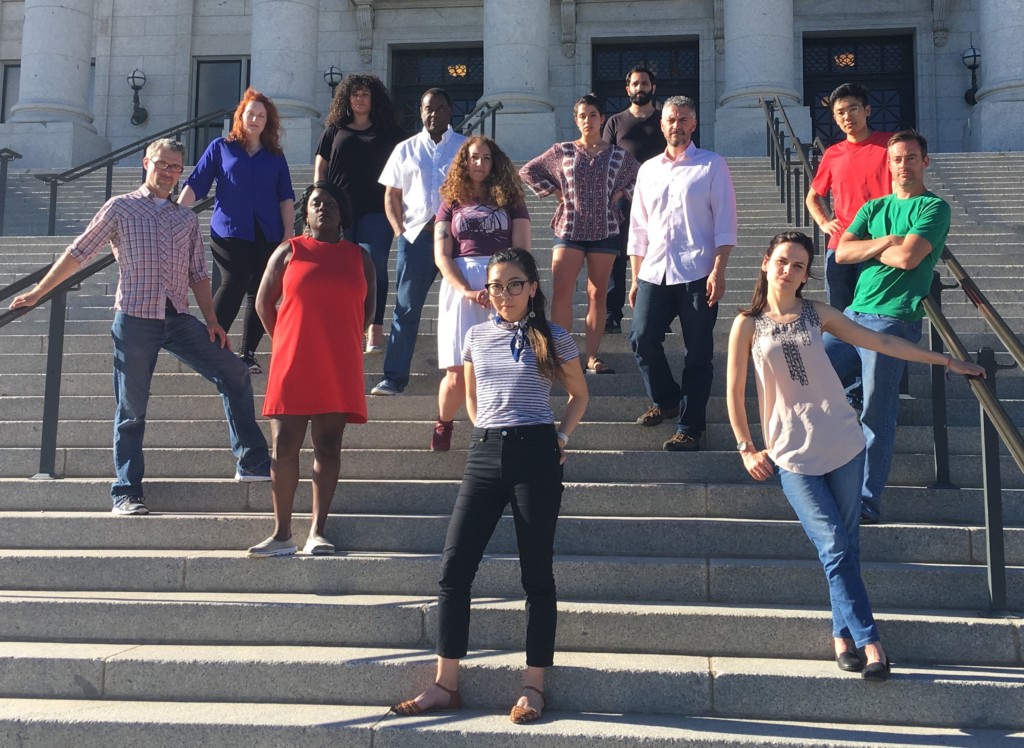

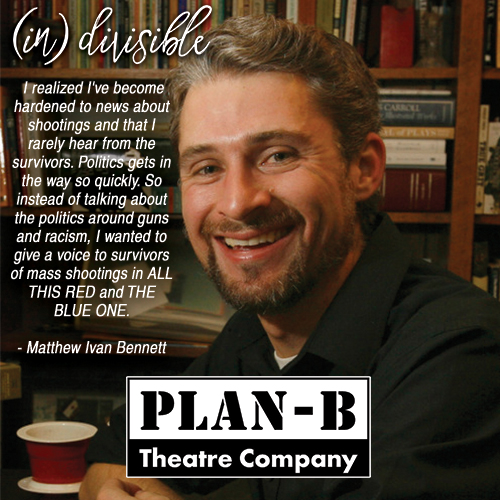
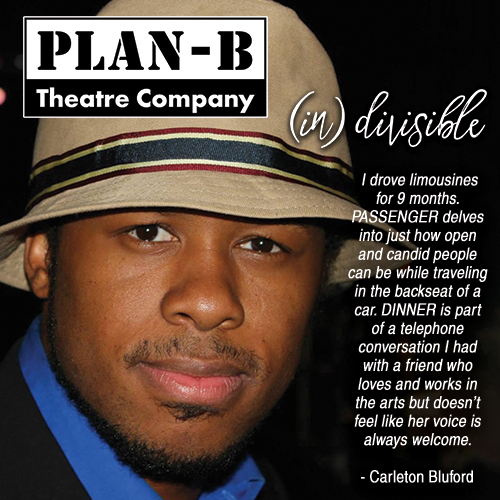

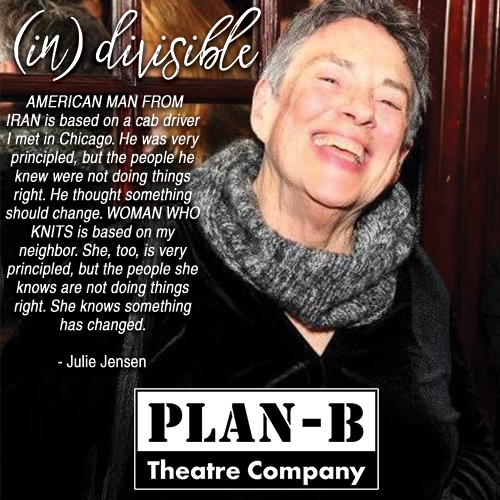
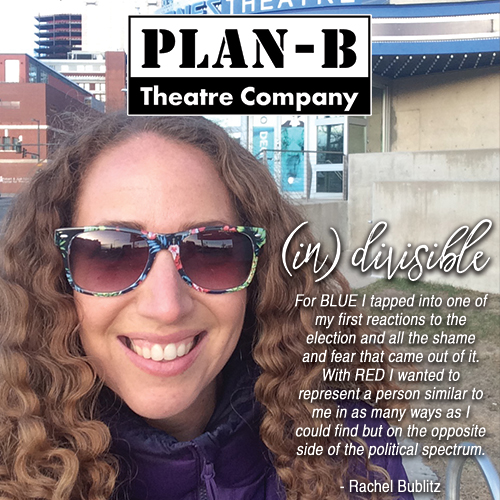








1 thought on “Overcoming the echo chamber emerges front and center in Plan-B Theatre’s (in)divisible”